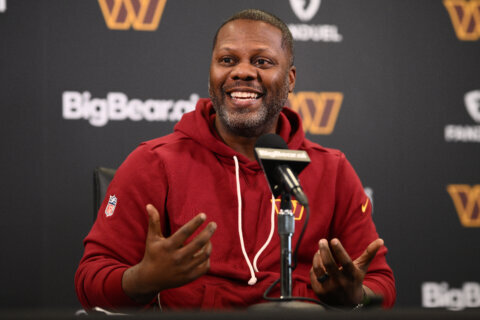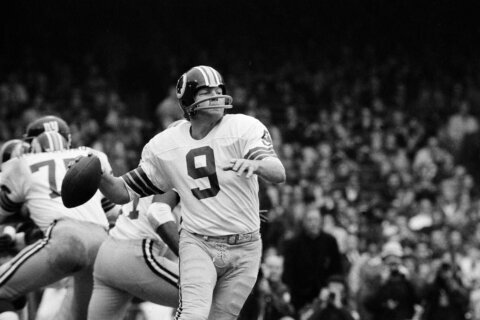Two things Heinicke must balance to become an effective QB originally appeared on NBC Sports Washington
Taylor Heinicke isn’t known as a traditional pocket-passer. He made his name as a quarterback who can extend plays with his legs and deliver passes off-schedule.
That’s what made him a star at Old Dominion, it’s what got him a job in the NFL with the Carolina Panthers and it’s what made Washington confident enough to sign him to a contract extension as their backup to Ryan Fitzpatrick. However, if he’s going to stick in the NFL and play at a higher level, he’ll have to develop inside the pocket.
As Ron Rivera told The Sports Junkies on Tuesday, Heinicke has worked diligently in practice to progress his skills in that area of the game.
“One thing that you see in practice is he’s really not as functional as you see him in the game because in practice, he’s trying to keep himself in the pocket,” Rivera said. “He’s trying to make himself develop a little bit more that pocket awareness. So in practice, he just doesn’t look as efficient as when he moving a little bit. When he improvises, that’s when he becomes even more dangerous, but in practice, he forces himself to go through it all.”
If there was a perfect time to voluntarily limit your own skillset to work on something else, it’s during practice. Nobody cares how well Heinicke can scramble against guys who aren’t allowed to hit him. We know what he can do with his legs.
But sharpening your pocket awareness and getting comfortable going through progressions with your eyes downfield? Putting in the time on those specific areas of the game is how you get the results you’re looking for when the lights are brightest; like a clutch touchdown pass into the corner of the endzone to Ricky Seals-Jones.
“If you watch him go through his progressions and he has a little hop, he turns and throws to Ricky [Seals-Jones],” Rivera said. “That little hop is usually when he takes off running. But he kind of made himself stay in there and go through it. He saw Ricky and I think that’s the result that we’ve seen in practice.”
Overall performance isn’t the only benefit to growing as a pocket passer. Heinicke’s had a particularly tough time staying healthy throughout his career, and it’s gotten to the point where it’s a significant factor in how evaluators look at his ceiling in the NFL.
“I’ve always liked Taylor,” Brian Baldinger told JP Finlay on 106.7 The Fan Monday. “He throws the ball with great anticipation and he knows where to go with the ball. The one thing that I think he’s got to caution, he takes off out of pocket a lot and he’s not a big guy. We’re seeing these quarterbacks go down left and right. If he keeps doing this, can he survive the hits in the NFL? I mean, not many can.”
Staying in the pocket, getting the ball out quick and relying on the offensive line to protect you are all important skills for a quarterback to have regardless of their size, but it’s certainly important for smaller players to look out for their own well-being out there.
If Heinicke can progress as a passer and keep himself healthy at the same time, Washington’s outlook changes with or without Fitzpatrick. At that point it could be time to talk about Heinicke as the No. 1 moving forward.
“The fewer hits you can take, the better chances you have of some longevity in this business,” Baldinger said.






